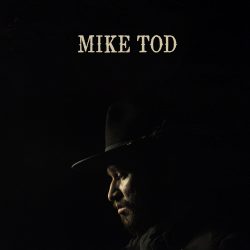An album of well-worn, primarily old-time folk tunes brought to life by excellent musicians.
 Mike Tod is an ethnomusicologist and practitioner of old-time music, based in Alberta, Canada. This album marks his debut, full-length release under his own name. But what exactly is “old time music” and is it still relevant in the twenty-first century? In his 1959 essay, “Folk Song Style”, Alan Lomax wrote that the intention of old time music was to reflect “personality-shaping experiences”, such as love and death, with the songs being played by small ensembles known as “string bands”, typically comprising fiddle, banjo, guitar, mandolin and double bass. Tod’s album certainly ticks all these boxes.
Mike Tod is an ethnomusicologist and practitioner of old-time music, based in Alberta, Canada. This album marks his debut, full-length release under his own name. But what exactly is “old time music” and is it still relevant in the twenty-first century? In his 1959 essay, “Folk Song Style”, Alan Lomax wrote that the intention of old time music was to reflect “personality-shaping experiences”, such as love and death, with the songs being played by small ensembles known as “string bands”, typically comprising fiddle, banjo, guitar, mandolin and double bass. Tod’s album certainly ticks all these boxes.
Several of the songs on this album originated in the British Isles and over the centuries have crisscrossed the Atlantic. The first song ‘The Coo Coo’ originates in the Scottish borders. Tod learnt his version from Ramblin’ Jack Elliot’s one. His raspy tenor relates evocative fragments of a restless life, with an abrasive, ominous fiddle, set against some fine banjo playing, adding to the song’s sense of unease. ‘The Blackest Crow’, a British folk song dating from the 1700s, is a tale of long-distance love. The eighteenth century fiddle tune, ‘Flowers Of Edinburgh’, is a lively instrumental featuring two violins and a bowed bass.
‘Cigarettes And Whiskey’ was written by Tim Spencer. Originally entitled ‘Cigarettes, Whusky And Wild, Wild Women’, The Pioneers took the single to number five on the US Country Chart in 1947. Tod’s version showcases some gorgeous four-part harmonies. ‘Undone In Sorrow’ was originally penned by Ola Belle Reed an American Appalachian folk singer, songwriter and banjo player. The song cautions against forsaking love to pursue material wealth. Tod’s recording may be smoother than Reed’s original, but it’s no less emotive with finger picked guitar, mandolin and fiddle to the fore.
‘Back To Home’ is the only song on the album written by Tod; however, it doesn’t feel out of place amongst the old-time tunes. It’s a twin banjo driven, nostalgic, look back on life in better, simpler times. ‘Little Wheel Spin And Spin’, released in 1966 by Buffy Sainte-Marie, is the most contemporary song on the record, but again Tod’s version fits in perfectly. As the song intimates what goes round comes round. ‘Cold Frosty Morn’, the record’s second instrumental, is another Scottish tune written to commemorate the battle of Culloden Moor.
Dating from 1933, ‘Wait For Me’ opens with the beautiful voice of Opal Retzer, Tod’s wife, which contrasts well with his rougher delivery. Fittingly for an old-time record the song features yodelling. The record is brought to a close by ‘My Alberta Rose’ a song written by the Romaniuk Family in the 1940s who performed in the style of the Carter Family. It evokes the passing of the seasons and the beauty of the mountains.
Tod’s take on old-time music highlights that it provides us with cultural continuity. The timeless nature of the songs and their themes shows that when delivered this beautifully, these songs will always be relevant.


